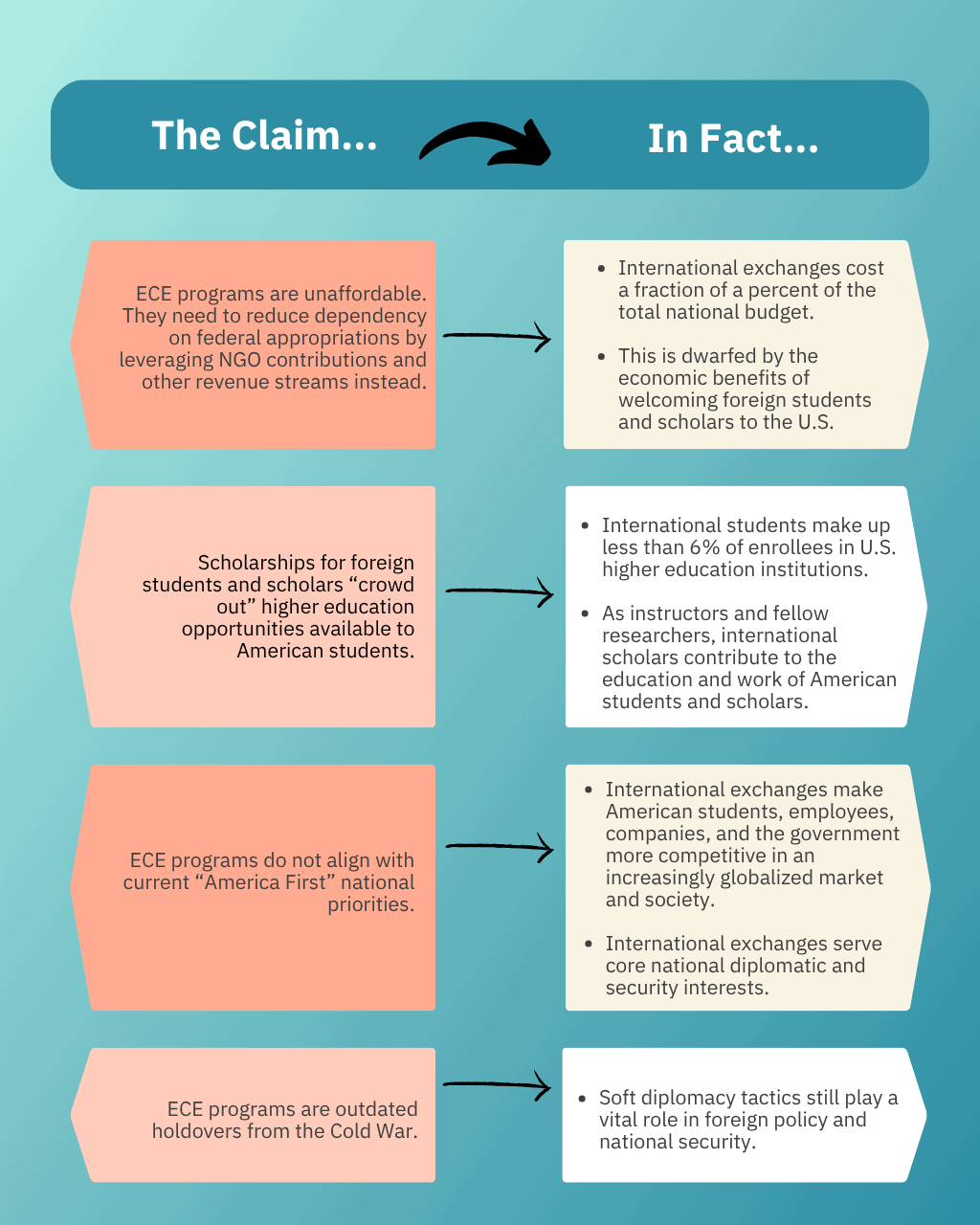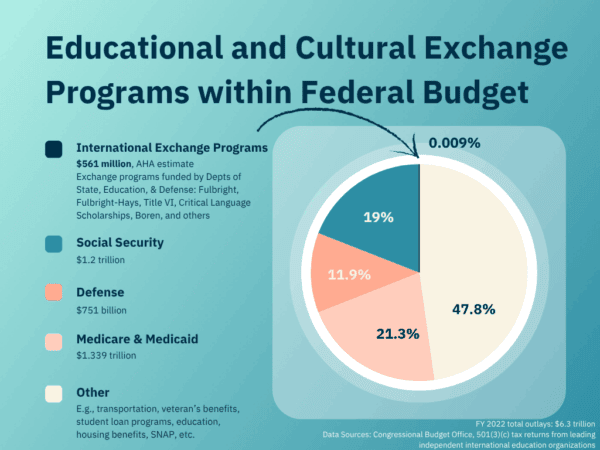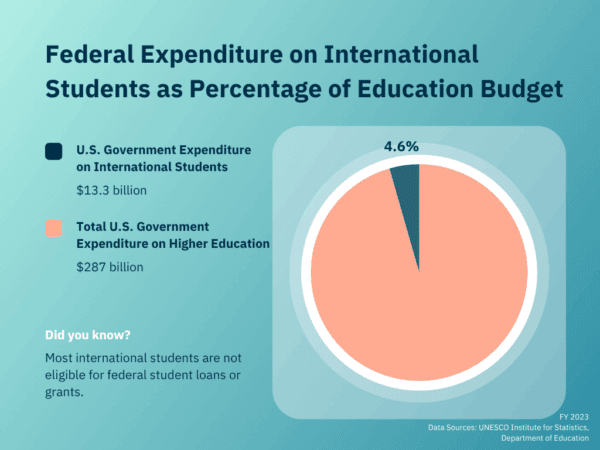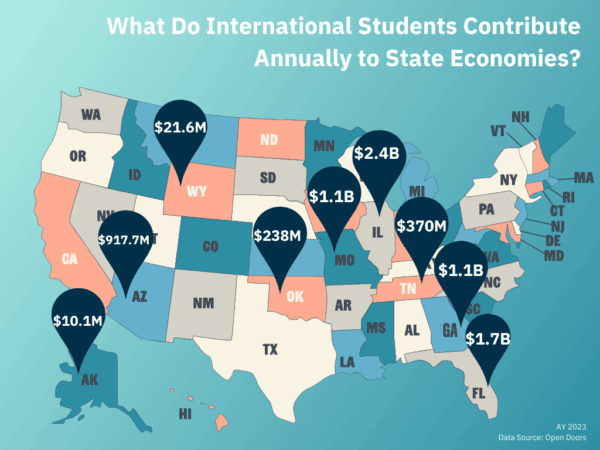Contents
Threats to International Education Today
How Is Federal Policy Threatening International ECEs?
Demonstrating the Value of International Education
Resources for Crafting Your Argument
Historians and International Education
Countering Arguments against International Education
Enacted & Pending Policies Affecting ECE Programs
Additional Resources on International Education
Threats to International Education Today
Support International Education Exchanges
For decades, federal educational and cultural exchange (ECE) programs—including the Fulbright, Title VI, and Fulbright-Hays—have provided invaluable opportunities for students, scholars, and educators in history and other disciplines. International exchanges play a pivotal role in many aspects of historical study, and federal funding ensures that students and scholars of all backgrounds have the ability to conduct research, further language acquisition, and collaborate with scholars in their fields.
More than 45 programs sponsored by the Departments of State, Education, and Defense enable tens of thousands of educational exchanges each year. Sponsored exchanges range from PhD students conducting dissertation research, to master’s students undertaking degrees at international institutions, to distinguished scholars lecturing in the USand overseas, from K–12 teachers and administrators learning about education in other parts of the world, to future federal employees learning languages critical to national interests, to supporting children of veterans with international education, and more. These exchanges are bilateral, bringing international students and scholars to the United States and in turn sending Americans abroad.
All historians—not solely those who research other parts of the world—benefit from international exchanges. State-sponsored exchanges first arose in the aftermath of World War II and during the Cold War, when the United States and its allies promoted international education with the goal of sharing knowledge between nations, strengthening international ties, and promoting global stability, all in the interest of national security and diplomacy.
The AHA has a strong record of supporting Title VI, Fulbright-Hays, Fulbright, and other ECE programs, as its own history demonstrates the scholarly and diplomatic benefits of supporting international education. Since the AHA’s founding in 1884, at least 99 presidents had international experiences—including studying, teaching, living, or working abroad—or were international scholars themselves. Fourteen of the last 15 winners of the AHA’s prestigious Herbert Baxter Adams Prize completed academic exchanges or were international-born scholars. International scholars and international scholarly exchanges contribute in countless ways to the field of history in the United States, from pathbreaking research to teaching the next generation of Americans.
International scholars and international scholarly exchanges contribute in countless ways to the discipline of history in the United States, from pathbreaking research to teaching the next generation of Americans. Essential ECE programs are under threat due to policy and funding objectives of the Trump administration. Proposed funding cuts threaten the ability of American universities to train a new generation of historians. While funding and maintaining such international exchange programs does require significant financial and personnel investment, their intellectual, diplomatic, and economic benefits far outweigh the costs.
"International connections were an absolutely essential—and wonderful—component of my long career. I could also add that I advised European PhD students and that several of my PhD students were advised by my European friends and colleagues."
Thomas F. X. Noble
Andrew V. Tackes Professor Emeritus, University of Notre Dame
"Ultimately, spending a year abroad in an unfamiliar place gave me fresh eyes. What I learned from my time abroad, and subsequent re-entry, can be summed up as follows. We come to the university—to history and to the humanities more broadly—with questions. An education provides us not so much with answers, but with the tools to pursue those questions—and the means to build the skills—listening, writing, research, engaging in conversation—to fathom a sense of who we are in the world—to clarify a fullness of being, of meaning, that no one else could have fully envisioned or articulated for us."
Laura Hostetler
Professor, Univ. of Illinois, Chicago
"As a Fulbright Lecturer in Hiroshima, Japan in 1977-78, along with my wife and two young children (4 and 7), I enjoyed all the joys and challenges of another culture and the enhanced perspective of my own . . . . Perhaps the most unanticipated benefit for all of us was on our return to the US and the realization of the impact this experience had on our sense of ourselves and our own culture. I was inspired to devote the remainder of my academic career in some aspect of international education, witnessing what even a two-week international study tour could mean for young people—and even faculty members--who had never been outside their state or the US."
Blaine Brownell
"I was a Fulbright Scholar in Hungary in 2013. I learned a great deal about the university system in Hungary, and in continental Europe in general. How general education and majors work was quite different. The same goes for how attendance, exams, and grading worked. This came in handy about a year and a half after I returned, when I was tapped to help lead my university's general education program. My European experience helped me offer comparisons and contrasts to colleagues and to students, so that we could all understand what we gain and what we lose in either model."
Gabriel Loiacono
Professor of History & Associate School Director of Public Affairs & Global Engagement, University of Wisconsin Oshkosh
How Is Federal Policy Threatening International ECEs?
Why Is This Important?
Now is the time to advocate for international education. The executive branch seeks to eliminate all funding for ECE programs, while Congress appears divided.Final votes on the FY2026 budget have not been cast.
The current presidential administration (in the FY2026 Executive Discretionary Budget Request and Department Budget Justifications) seeks to eliminate funding for all ECE programs at the State Department and Department of Education, including Fulbright, Fulbright-Hays, and Title VI programs. Not only would these cuts effectively dismantle longstanding programs established by acts of Congress, but they would also considerably impact independent study abroad organizations that rely on government grants and/or administration to facilitate international exchanges.
- The proposed executive budget would withdraw all funding from the Department of Education’s “Title VI” (International Education and Foreign Language Studies Domestic Programs) and Fulbright-Hays Programs (cutting $85.7 million).
- The proposed budget also calls for defunding the State Department Bureau of Educational and Cultural Affairs entirely (cutting $691 million).
- Provisions in Congressional appropriations bills would restrict funding to projects that align with current administration “anti-DEI” initiatives, thereby limiting academic and research freedom and potentially allowing partisan influence over fellowship selection.
However, recent legislative actions indicate that support for international education persists among some members of Congress. The proposed House Appropriations for the Department of State (HR 4779) and the proposed Senate Appropriations for the Department of Education (S2587) would protect much of the existing funding for international exchange, if passed. On the other hand, the House Appropriations for the Department of Education (H.R. 5304)—seeks to eliminate funding for HEA-Title VI and Fulbright Hays programs. (As of September 23, 2025, the Senate has yet to release its appropriations bill covering the Department of State.) Lawmakers appear divided, and now is the time to advocate.
Demonstrating the Value of International Education
How can we explain the importance of international education to policymakers and other audiences?
Many elected officials have participated in international exchange programs and are likely familiar with the personal benefits they provide. But many policymakers remain unaware of the broader economic, diplomatic, and security ramifications of such programs.
- International students and scholars directly support state and national economies in the United States. In 2023, international students contributed $43.8 billion to the US economy, through tuition paid to host universities, travel expenses, housing expenses, food and other taxable sale items, and visa fees.*
- All states are positively impacted by their international students, not only states like California and New York, which enroll particularly high numbers of international students. Even Wyoming and Alaska—the states that enrolled the fewest international students in AY2023, at 839 and 297 students, respectively—gained a combined $30.7 million as a result of their international admits.
- Funding for international education comprises less than 1% of the national budget.
*Arguments based on national economic interests are resonating less with the current administration but may still be persuasive to other lawmakers.
Resources for Crafting Your Argument
The Many Benefits of ECEs
- Participating in international exchanges makes American students more desirable to employers and better prepared to enter the global economy.
- Increasing globalization of the economy has encouraged students to seek out educational programs that will provide skills necessary to engage in a global workforce, such as language competency and cultural awareness.
- A 2017 study by New American Economy found that in 2015, employers posted approximately 630,000 job listings seeking bilingual applicants, a 162.5% increase from 2010, particularly for positions in customer service, sales, medicine, financial services, and business administration.
- In a 2017 Institute of International Education study, alumni in STEM fields credited their study abroad experiences for the acquisition of soft skills like problem-solving, adaptability, and cultural awareness, which gave them a hiring advantage over peers with similar credentials but no study abroad experience.
- International exchanges serve core national diplomatic and security interests.
- Programs focusing on critical languages and area studies ensure there are American experts in the languages and cultures of global regions that historically have—and under the current administration, continue to be—identified as key to national security strategy, including China, the Middle East and North Africa, and Russia.
- By increasing contacts between ordinary Americans and individuals of other nationalities, international exchanges encourage goodwill toward the United States and its people. They challenge negative and uninformed stereotypes of Americans. American students and scholars serve as unofficial ambassadors, abroad.
- Many American students report greater appreciation for the United States and American culture upon returning from study abroad.
- International exchanges provide foreign students and scholars higher education opportunities that are inaccessible in their home countries, particularly for women and other at-risk scholars.
- The United States has a long history of offering and facilitating asylum to foreign scholars at risk, who go on to advance education in their host countries. Since 2002, the Institute of International Education (IIE) Scholar Rescue Fund has aided 1,166 at-risk scholars from 62 countries through relocation assistance and over $48 million in fellowship grants.
Historians and International Education
Why Do Historians Need International Education?
Ensuring intellectual, legal, and physical protection is essential to attracting and retaining international students and scholars in the United States. Previous and emerging trends indicate that removing such protections will likely force international students and scholars to study in other countries, taking their expertise and goodwill with them. Consequently, the United States risks losing its status as the foremost global driver of research. Furthermore, due to the expectation of reciprocal agreements between nations, greater restrictions on incoming academic mobility will likely create additional barriers for American students and scholars to study and research abroad.
- The study of history, including American history, requires international travel and intellectual exchange.
- Immersive language studies: Language learning is a bedrock prerequisite for responsible historical research.
- Conducting archival research: The vast majority of archival documents throughout the world have not been digitized, due to the extensive quantity of documents, a lack of resources, and/or preservation concerns. Some archives lack thorough catalogs, making it difficult to remotely request digitization.
- Site-specific research: archeological excavations, oral history collection, anthropological observations, codicology, environmental analysis, etc.
- Attending conferences: to share research and network with other historians.
- Learning theoretical and methodological approaches from other intellectual contexts; scholars from different countries often analyze and interpret the same historical events in different ways.
- International scholarly collaboration produces more and better research.
- Travel and exchange make Americans world-leading producers of history across many fields other than US history
- Exchanges with individuals of different backgrounds, cultures, and worldviews promote intellectual diversity in IHEs. International scholars in the United States serve on thesis and dissertation committees, as undergraduate and graduate advisors, and as graduate and teaching assistant supervisors.
Countering Arguments against International Education
What arguments Are Used against International Education?
Administration Claims Against International Education
- ECE programs are unaffordable. They need to reduce dependency on federal appropriations by leveraging NGO contributions and other revenue streams instead.
- Programs supporting foreign students and scholars “crowd out” higher education opportunities available to American students.
- ECE programs do not align with current “America First” national priorities.
- ECE programs are outdated holdovers from the Cold War.
How to Respond to These Claims
Despite contrary claims by the current administration, decades of evidence demonstrate that international exchanges, both incoming and outgoing, create rather than foreclose opportunities for Americans.

Infographic by the AHA.
Enacted & Pending Policies Affecting ECE Programs
Executive Orders and actions throughout 2025 have increased scrutiny of visa holders and applicants, and targeted the due process of non-citizen residents and intellectual freedom of students, scholars, and federally-funded Institutes of Higher Education (IHE). Anti-DEI and “America First” compliance has been mandated for IHEs and educational and cultural exchange programs. Increased scrutiny has been applied to foreign funding of American IHEs.
A list of selected enacted and pending policies impacting international education can be found below.


